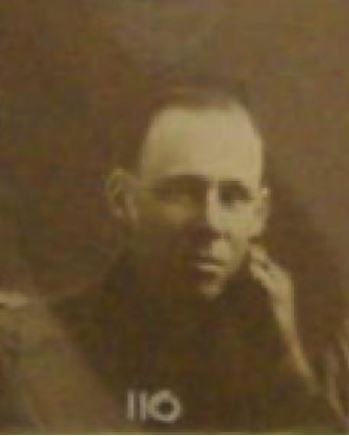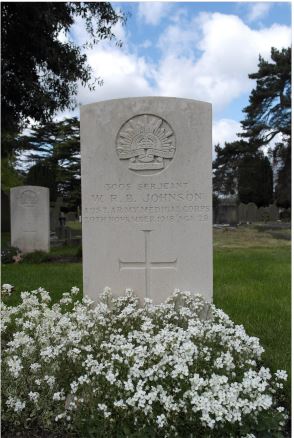15th Field Ambulance, Australian Army Medical Corps

According to his enlistment papers Walter Richard Buchanan Johnson was born at Ultimo, Sydney, New South Wales (NSW), however, the CWGC Register states his birth place to be Pyrmont, NSW. Both appear to be inner city suburbs of Sydney. He was born in 1890, the son of William Harry and Mary Johnson of Glenella, Millett Street, Hurstville, NSW.
His stated occupation on enlistment was ‘farmer’ and on the date of enlistment, 25 March 1915, his age to be 25 years one month. Enlistment was at Liverpool, a Sydney suburb. His initial unit was 5th Field Ambulance and he was promoted from Private to Driver on 31 May 1915, the date on which he embarked from Sydney to Egypt on board the HMAT Ajana. From here he went to Gallipoli on 16 August 1915 but there are no details of any action seen there. On 25 November 1915 he returned to Egypt, to Maadi and on 24 February 1916 he was posted to 15th Field Ambulance (5th Australian Division) at Tel el Kabir. Promotion to Transport Sergeant at Ferry Post followed on 6 May 1916 and on 18 June 1916 he sailed from Alexandria, arriving at Marseilles on 27 June 1916.
Service with the British Expeditionary Force (BEF) in the field followed until 1 January 1918, when he undertook a period of detachment to 23rd Vet Hospital until 11 January 1918, when he rejoined 15th Field Ambulance. The period 12 to 27 February was spent in the UK on furlough. On 30 June 1918 he went to A C Gas School as an instructor, returning to 15th Field Ambulance on 6 July.
On 26 July the unit went to the 4th Army Rest Camp at Le Treport and were due to stay there for a seventeen day period. Two days after arrival Sergeant Johnson approached the CO of the 4th Army Rest Camp for permission to visit Paris. This was refused but, according to him, the CO, when asked, stated that he did not object to him leaving the camp for an extended period, provided he was back in time for his unit’s departure. The lure of Paris still lingered and Johnson visited the local station and got into conversation with a Military Policeman (MP), who said that he would not have any difficulty getting to Paris. So he bought a ticket and boarded the 12.45pm train, arriving in Paris at 7pm on 30 July. Having spent a few days in the French capital Johnson headed for home and the 8.15pm train from the Gare du Nord. Going through the barrier he was apprehended by a MP, who demanded his authority to be in Paris. Not having the required papers Johnson was placed under arrest and taken to Police HQ, where he was held until 4 August and ordered to return to his unit by train. In due course he was down to face trial for his unauthorised excursion.
On 22 August 1918 he reported sick to 55 Casualty Clearing Station and was transferred to the 10th General Hospital at Rouen. Here a medical board identified that he was suffering from a tumour on his right kidney and that he was unlikely to be fit to stand trial or for any further active service. A month later, on 23 September, he was invalided to England on board the Hospital Ship Grantully Castle and on the 24th was admitted to the Leckhampton Court Red Cross Hospital. On 29 September he was operated on at Cheltenham General Hospital but it was discovered that the cancer was too advanced for there to be any chance of survival. He eventually
died at 3.30am on 20 November 1918, aged 28.
His burial at Cheltenham Cemetery was a private one and took place on 23 November, the Vicar of All Saints conducting the funeral. Amongst the wreaths laid, were those from the Leckhampton and Cheltenham General Hospitals. In due course his grave received a standard CWGC headstone.

Researched by Graham Adams 26 February 2013
(Photo taken from website www.ww1austburialsuk.weebly.com)
